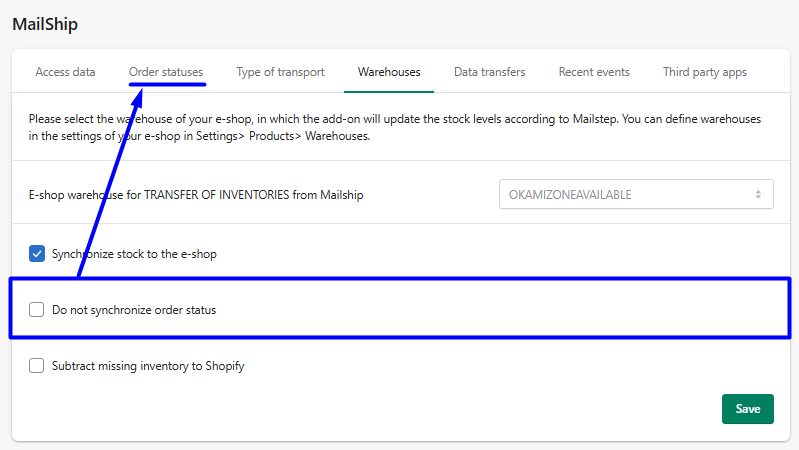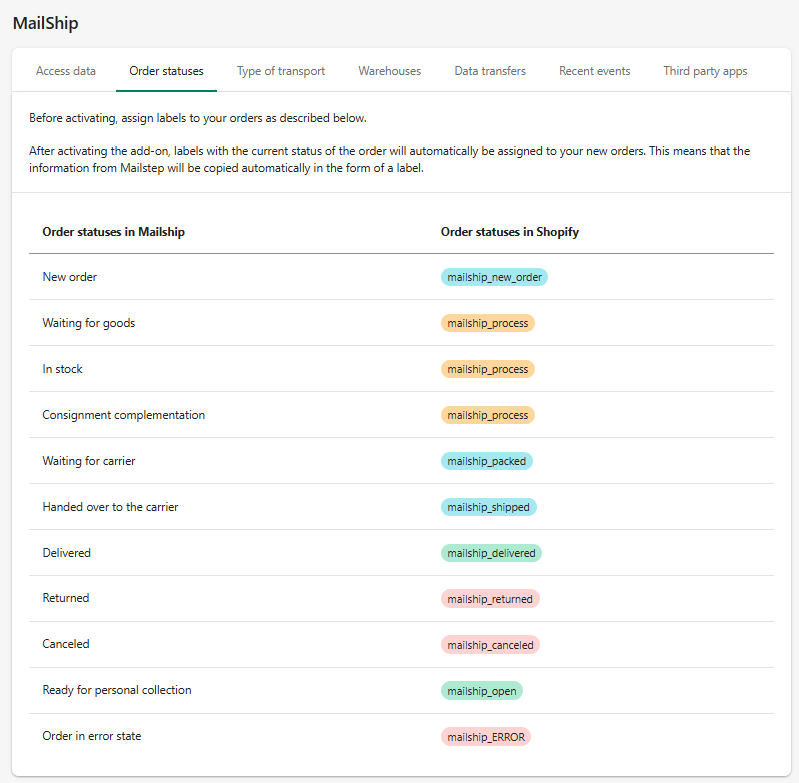Sync Configuration in the Shopify Plugin
In the "Warehouses" and "Data Transfers" tabs, you can choose settings that affect warehouse sync, stock levels, and other related options.
Product Sync from E-shop to Mailship
Data Transfers → Product synchronization e-shop -> Mailship
To successfully sync products, make sure each product card has a valid SKU and barcode filled in.
Use the sync button only if multiple products haven’t transferred to Mailship.
There is no need to use it for regular product changes – those sync automatically.
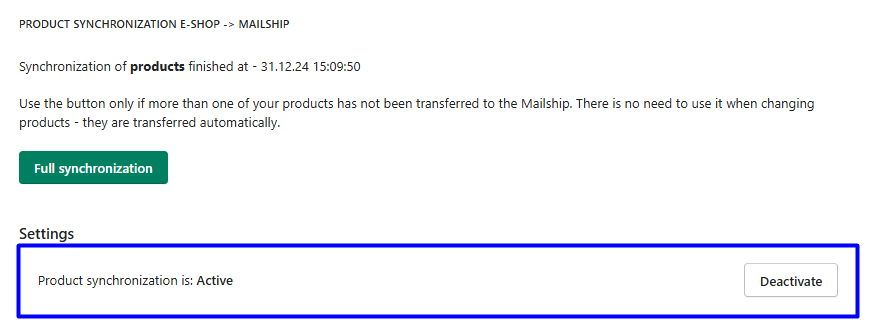
Stock Sync
To correctly sync stock levels, you need to ask Mailship customer support to activate webhooks when first turning on the plugin. Without this, the data won’t update automatically.
Warehouses → Synchronize stock to the e-shop
This feature ensures that stock levels from the Mailship portal are automatically transferred to your Shopify store.
Every time stock changes in Mailship, it is immediately updated in Shopify.
In addition, there is a daily full stock sync at around 1:00 AM to fix any possible differences.
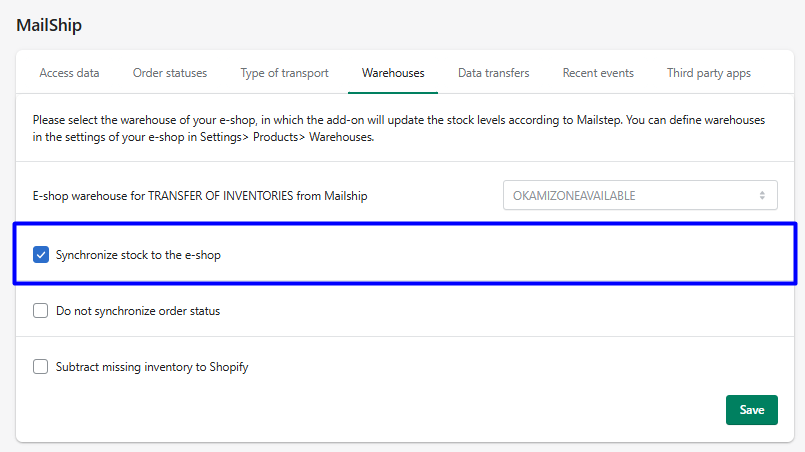
Data Transfers → Synchronization of stock Mailship -> e-shop
In the "Warehouses" tab, you will find a button for Full Sync. Use this only if some of your stock data didn’t transfer correctly to Mailship.
There is no need to use it for normal stock updates – these happen automatically.

What are the stock sync options?
Synchronisation of Mailship: QTY stock → Shopify: On hand (default)
Synchronisation of Mailship: QTY available → Shopify: Available quantity (on request)
Mailship: QTY stock → Shopify: On hand (default)
This is the default method and is best when you use one Shopify store connected to one Mailship account.
For this mode is not recommended to create manual orders in Mailship, as it can cause stock mismatches. If you do create order manually in Mailship, it should be also created in Shopify to keep stock levels accurate.
Mailship: QTY available → Shopify: Available quantity (on request)
Use this option if you have multiple Shopify stores but only one Mailship account.
In this mode, only the available (non-reserved) stock is synced. This helps prevent conflicts between different Shopify stores that don’t share reservation data.
Order Sync
Data Transfers → Order Sync E-SHOP → MAILSHIP
What are the order sync options?
Standard Order Sync: Active / Inactive
Order Sync with Tag: Mailship
Standard Order Sync: Active / Inactive
This setting controls whether orders are sent to Mailship.
If enabled, orders are synced immediately after they are created.
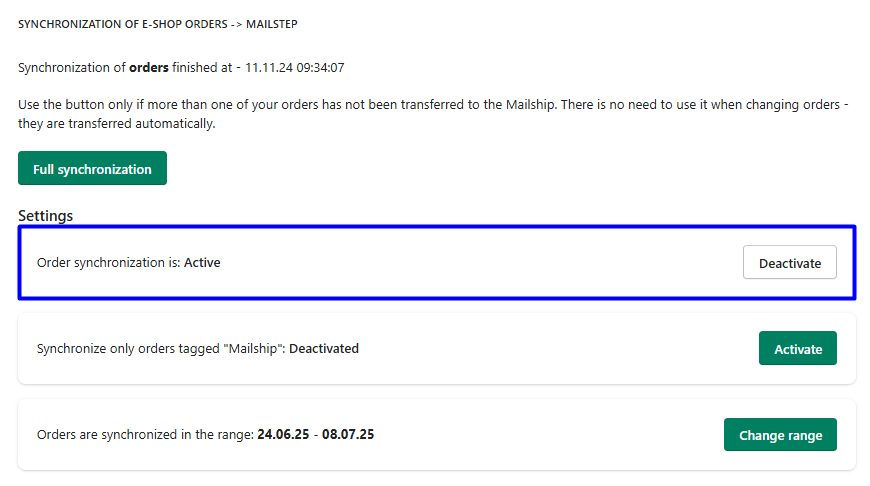
Order Sync with Tag: Mailship
This option lets you choose which orders should be fulfilled via Mailship.
By default, this feature is turned off. You can enable it manually.
When active, only orders with the tag “Mailship” will be synced.
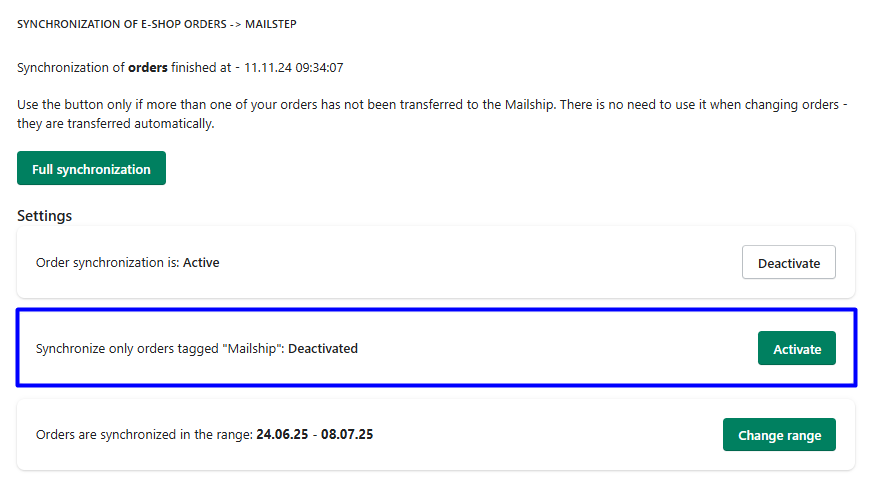
Full Synchronization Button
Use the Full Sync button only if multiple orders were not transferred to Mailship.
You don’t need to use it for regular order changes – those sync automatically.
Before using it, select the time period for which you want to sync the orders.
Delayed Order Sync
Data Transfers → Orders delayed synchronization
This setting defines how long to wait before sending new orders to Mailship.
By default, orders are synced as soon as they are created.
If you want to make changes to the order (like adding products or updating shipping details) before it's sent to Mailship for processing, you can set a delay in minutes.

Allow Selling Out-of-Stock Products (Negative Stock Deduction)
Warehouses → Subtract missing inventory to Shopify
If this setting is enabled, your Shopify stock can go into negative values. This allows you to sell products even when they are not currently in stock.
If you disable this option, Shopify will not allow negative stock. The product won't be available for ordering unless it is in stock.
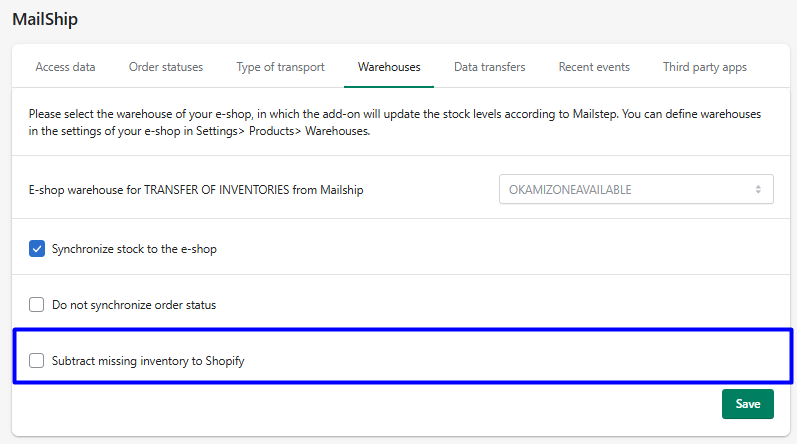
Order Updates
Data Transfers → Update Order
This setting controls whether orders in the Mailship system are updated when changes are made in Shopify. Updates include changes like the recipient's email, address, or phone number.
These updates only apply when the order in Mailship is in one of the following statuses:
Incorrect
On Hold
To be confirmed
Waiting for goods
Automatic Marking of COD Orders as Paid
Data Transfers → Marking orders as paid
This setting controls whether orders are automatically marked as paid when they are both delivered and were paid using cash on delivery (COD).

Order Status Sync
To sync order statuses correctly, you need to ask Mailship customer support to activate webhooks when first enabling the plugin. Without this, the data will not update automatically.
Warehouses → Do not synchronize order status
This setting controls whether expedition tags based on the current order status in Mailship are sent to your Shopify store.
If you want to enable order status sync, leave the checkbox unchecked.
If you check the box, order statuses will not be synced to your e-shop.
A full list of status tags synced when this feature is active is available in the Order Statuses tab. These tags are fixed and cannot be changed individually.
